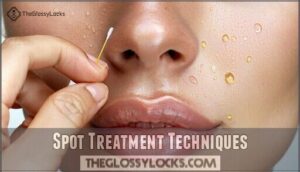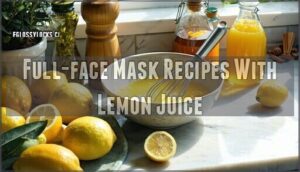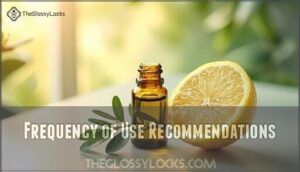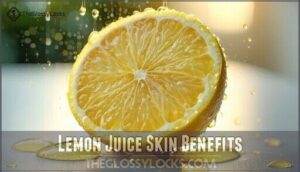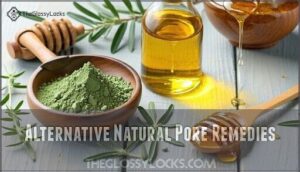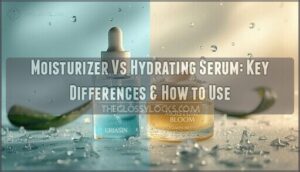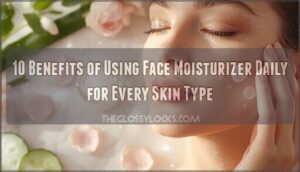This site is supported by our readers. We may earn a commission, at no cost to you, if you purchase through links.

This natural acid dissolves dead skin cells and excess oil that block your pores, similar to store-bought exfoliating products.
The vitamin C in lemon juice also provides antioxidant benefits for your skin.
However, you’ll need to dilute it properly – straight lemon juice is too harsh and can cause irritation or burns.
Mix one part lemon juice with two parts water before applying.
Be aware that lemon juice makes your skin more sensitive to sunlight, so always use sunscreen afterward.
While it’s not a miracle cure, many people find it helps when used correctly and consistently.
Table Of Contents
- Key Takeaways
- Lemon Juice Benefits
- Does Lemon Juice Help
- Using Lemon Juice Effectively
- Lemon Juice Skin Benefits
- Risks and Alternatives
- Frequently Asked Questions (FAQs)
- How to get rid of clogged pores naturally?
- How to get rid of Blackheads and clogged pores?
- How to get rid of clogged pores with baking soda?
- Is lemon juice good for oily skin?
- Does lemon juice kill pimples?
- Does Greek yogurt help clogged pores?
- Does lemon juice unclog pores?
- What is the fastest way to unclog pores?
- How to draw out a deep clogged pore?
- Can lemon juice be applied directly on the face?
- Conclusion
Key Takeaways
- You’ll need to dilute lemon juice properly – Mix one part lemon juice with 2-4 parts water, since pure lemon juice is too harsh and can cause burns or irritation on your skin.
- It can help unclog pores through natural exfoliation – The citric acid dissolves dead skin cells and excess oil that block your pores, similar to commercial chemical exfoliants.
- You must use sunscreen after application – Lemon juice makes your skin extremely sensitive to sunlight, potentially causing severe burns, dark spots, or permanent scarring if you are exposed to UV rays.
- Results aren’t guaranteed and safer alternatives exist – While some people see improvement, about 30% experience irritation, and gentler options, like clay masks or salicylic acid, offer more reliable results without the risks.
Lemon Juice Benefits
You’ve probably heard that lemon juice can work magic on your skin, but does it really help with those stubborn clogged pores.
The citrus fruit contains natural acids and vitamin C that might offer some pore-clearing benefits, though the science tells a more complex story than many home remedy enthusiasts realize.
Acidic Properties of Lemon Juice
Lemon juice packs a powerful punch with its acidic nature, boasting a pH level around 2.0 that makes it nature’s own skin care warrior.
Nature’s acidic powerhouse delivers serious pore-fighting potential at pH 2.0.
This citric acid powerhouse creates chemical reactions that can help tackle clogged pores through its astringent properties. Lemon juice also contains antioxidant effects from vitamin C and flavonoids.
Here’s what makes lemon acids so effective for pore cleansing:
- pH Levels – The low pH disrupts bacterial growth on your skin
- Chemical Composition – Citric acid breaks down oil buildup naturally
- Acidic Effects – Creates an environment hostile to pore-clogging debris
- Acidic Reactions – Helps dissolve dead skin cells blocking your pores
Natural Exfoliation Potential
Beyond their acidic nature, citrus fruits contain gentle acids that promote natural skin renewal through enzyme activation.
When you apply lemon juice to clogged pores, the natural acids help speed up cellular turnover, allowing dead skin cells to shed more easily.
This natural exfoliation process can help clear blocked pores without harsh scrubbing.
However, lemon juice may compromise your skin barrier, so consider milder natural alternatives for regular pore cleansing in your skin care routine, which involves natural skin renewal and gentle acids.
Astringent Qualities for Pore Tightening
When you apply fresh citrus, you’re tapping into powerful astringent mechanisms that temporarily contract skin tissues.
This natural tightening effect can make your pores appear smaller, though the results aren’t permanent.
Here’s what happens:
- Immediate contraction – Acids cause temporary tissue tightening
- Surface tension – Natural toners create a film that smooths skin texture
- Protein coagulation – Astringent properties bind temporarily with skin proteins
While lemon benefits include this pore-minimizing effect, remember that true pore size changes require long-term skincare approaches rather than quick astringent fixes.
Vitamin C Content and Skin Benefits
You’ll find that lemon juice contains high concentrations of vitamin C, a powerful antioxidant that offers impressive skin benefits.
This antioxidant skin protection helps fight free radical damage while supporting collagen synthesis boost for firmer skin.
Vitamin C absorption can improve pore size appearance and reduce hyperpigmentation, and when used as a facial cleanser, lemon benefits include enhanced skin texture and brightness, making it a natural choice for healthier-looking skin with impressive skin benefits.
Antibacterial Properties for Acne Prevention
Within your acne treatment arsenal, lemon’s natural antibacterial compounds target acne bacteria effectively.
These citrus warriors create an unwelcome environment for bacterial resistance while supporting preventative skincare.
However, topical application requires careful consideration—lemon’s potency can overwhelm sensitive skin.
When incorporated thoughtfully into your facial cleanser or skin care routine, lemon for skin delivers targeted acne prevention benefits, and its natural compounds can be seen as citrus warriors, providing a form of preventative skincare.
Does Lemon Juice Help
You’ve likely wondered if that citrus sitting in your kitchen can actually tackle stubborn clogged pores.
The short answer is that lemon juice contains citric acid which can help dissolve dead skin cells and excess oil, but it’s not as straightforward as squeezing a lemon on your face.
Effectiveness on Clogged Pores
Lemon juice’s effectiveness on clogged pores stems from its natural acidic properties, which can help dissolve buildup and reduce pore size appearance.
The citric acid acts as a gentle exfoliant for blackhead removal and whitehead reduction while controlling oil production.
However, its inflammation reduction abilities vary substantially between skin types, making lemon for skin applications unpredictable for consistent acne treatment and pore minimization results.
Science Behind Lemon Juice and Pores
Research reveals fascinating cellular mechanisms when you examine lemon juice’s impact on pores.
The science centers on four key processes:
- Lemon pH disrupts skin barrier – creating temporary pore appearance changes
- Citric acid triggers cellular effects – promoting surface exfoliation
- Pore size perception shifts – through temporary tissue contraction
- Skin impurities loosen – via acidic dissolution
However, lemon juice benefits for skin come with significant lemon juice side effects, including barrier damage and irritation.
The risk of phytophotodermatitis from sunlight is a major concern.
User Reviews and Ratings
Real users share mixed experiences with lemon juice for pores. About 60-70% report noticeable improvement in blackheads and pore visibility, while 30% experience irritation.
Rating distribution shows most products score 3.5-4.2 stars, with verified purchases emphasizing diluted applications work best for skin care routines.
Lemon juice contains alpha hydroxy acids, which may provide gentle exfoliation.
| Review Category | User Feedback |
|---|---|
| Pore Improvement | 60-70% report reduced blackheads |
| Rating Average | 3.5-4.2 stars on skincare forums |
| Common Side Effects | 30% experience redness or stinging |
| Preferred Method | Diluted solutions (1:3 ratio) |
| Repeat Usage | 50-60% continue past one month |
Using Lemon Juice Effectively
If you’re considering lemon juice for clogged pores, proper application methods can make the difference between helpful results and skin irritation.
The key lies in understanding safe dilution ratios, targeted application techniques, and recognizing your skin’s tolerance levels.
Dilution Ratios for Safe Application
You’ll want to mix lemon juice with water at a 1:3 or 1:4 ratio for application safety.
This dilution strength protects your skin sensitivity while maintaining citrus benefits. Pure lemon juice disrupts pH balance, causing skin irritation.
For premixed options, consider a suitable dilution product.
Your DIY skincare routine should include carriers like aloe vera or honey for safer facial treatment. These skin care tips prevent chemical burns while delivering gentle exfoliation.
Spot Treatment Techniques
Now that you’ve got your dilution sorted, you can pinpoint problem areas with precision.
Spot treatment lets you tackle stubborn blackheads and clogged pores without overwhelming your entire face.
Here’s your targeted approach:
- Application timing: Apply diluted lemon juice after skin cleansing but before moisturizer for maximum penetration
- Targeted application: Use a cotton swab for precise placement on individual blackheads and problem zones
- Patch testing: Test on a small area first, especially if you have oily skin or sensitive areas
Full-face Mask Recipes With Lemon Juice
Blending up DIY Lemon Masks lets you tweak recipes for oily skin or your unique facial care routine.
Use gentle mask application tips—avoid your eyes and mouth.
Every ingredient brings something to the table, literally.
For those seeking readily available options, consider pre-made lemon masks.
Here’s how key mask recipes compare:
| Mask Type | Key Ingredients |
|---|---|
| Classic Glow | Lemon, honey, yogurt |
| Clay Cleanse | Lemon, bentonite clay |
| Brightening | Lemon, turmeric, milk |
| Exfoliating | Lemon, sugar, oil |
| Hydration Boost | Lemon, aloe, honey |
The DIY Lemon Masks are customizable for oily skin and can be tailored to fit your unique facial care routine, making them a great option for those looking for a personalized skincare approach with lemon as a key ingredient.
Frequency of Use Recommendations
Every skin care routine thrives on balance. For lemon juice, skip daily use—think once or twice a week, tops.
Weekly limits matter since too much exfoliation can hurt skin. Keep application duration under ten minutes to dodge irritation.
Overdoing it may cause long-term effects. Skin cycling helps, so rotate other skin care ingredients and follow smart skin care tips and tricks.
For a thorough approach, consider tea tree oil benefits to enhance your routine with tea tree oil.
Precautions for Sensitive Skin Types
If your skin acts up when trying new things, do a Patch Testing run before slathering on lemon juice.
Play it safe with lower Dilution Strength and shorter Application Time, always watching for Redness Monitoring.
Skin sensitivity means you’ll want gentle skin care precautions. Consider natural astringents or Alternative Remedies if skin inflammation or irritation flares from strong skin care ingredients.
Lemon Juice Skin Benefits
You might’ve heard that lemon juice can help improve your skin, but you may wonder if it really works.
Scientists have studied its potential for unclogging pores, brightening skin, controlling oil, and even reducing acne scars.
So let’s look at what the evidence says about its effectiveness, particularly in terms of reducing acne scars.
Pore Unclogging Potential
After understanding how to use lemon juice safely, let’s focus on its pore unclogging potential.
Lemon juice efficacy stands out for helping shrink pore size and tackling those stubborn blackheads and whiteheads.
Try these deep cleanse methods for a healthier skin care routine:
- Pore size reduction
- Blackhead removal
- Whitehead treatment
- Improved skin health
- Support for clear skin
Skin Brightening Effects
After exploring how lemon juice may help unclog pores, let’s talk about skin brightening.
Thanks to its vitamin C, lemon juice is famous for its Lemon Brightening effects.
Many folks aim for an even skintone and want to fade a dark spot or two.
A bit of lemon can give your skin tone a gentle radiance boost and improve skin clarity.
Oil Control Properties
Lemon juice naturally cuts through excess oil, making it a powerful ally in your skincare routine.
Its citric acid content helps balance sebum production while providing oil absorption properties that many commercial products can’t match.
- Sebum Reduction: Citric acid helps regulate your skin’s natural oil production
- Shine Control: Creates a temporary matte finish that lasts throughout the day
- Oil Absorption: Acts like a natural blotting paper for greasy areas
- Pore Minimizing: Tightens skin appearance by removing excess oils from pores
- Natural Alternative: Replaces harsh skin care products with gentler oil control solutions
Collagen Production Stimulation
Beyond oil management, lemon juice might boost your skin’s structural support.
Vitamin C triggers fibroblast activation, encouraging cells to produce more collagen through enhanced peptide synthesis. This process converts procollagen into mature collagen fibers, potentially improving skin firmness.
However, skin care research shows inconsistent results, and antioxidants from other sources often prove more reliable for supporting skin hydration and overall skin care benefits.
| Collagen Factor | Lemon Juice Effect | Research Status |
|---|---|---|
| Vitamin C Content | Moderate levels present | Limited studies |
| Amino Acids | Minimal contribution | Insufficient data |
| Peptide Synthesis | Potential stimulation | Needs more research |
| Procollagen Conversion | May support process | Inconclusive evidence |
Acne Scar Reduction Possibilities
Occasionally, you’ll discover that lemon juice might help fade certain acne scars, though results vary dramatically by scar type.
The vitamin C content supports skin rejuvenation and may improve skin texture over time.
However, professional procedures offer more reliable treatment options than home remedies.
Prevention strategies remain your best defense against skin blemishes, while dermatology experts recommend proven skin care solutions for lasting results.
Risks and Alternatives
While lemon juice might seem like a natural solution for clogged pores, it can actually cause more harm than good if you’re not careful.
You’ll want to understand the potential risks and explore safer alternatives that won’t leave your skin irritated or damaged.
Skin Irritation and Redness
Applying lemon juice directly can trigger skin irritation and redness in many people.
The citric acid’s harsh nature overwhelms your skin’s natural barrier, causing inflammation that feels like a mild burn.
Sensitive skin types face higher risks of developing contact dermatitis.
If redness appears, stop treatment immediately and focus on gentle healing remedies to restore your skin’s comfort.
Consider that environmental factors like pollution can also exacerbate redness, so using daily sunscreen is essential to prevent further irritation and promote gentle healing for sensitive skin.
Photosensitivity Concerns
When you use lemon juice on your skin, UV exposure becomes a serious concern.
Lemon phototoxicity can cause severe burns and blistering when your treated skin meets sunlight. Sunscreen necessity isn’t optional—it’s mandatory for weeks after application.
Here are key photosensitivity symptoms and precautions:
- Dark patches appear where lemon juice contacted skin exposed to sun
- Burning sensations occur within hours of UV exposure after lemon treatment
- Blistering and swelling develop from phototoxic reactions lasting days
- Long-term effects include permanent scarring and uneven skin tone
- Photosensitivity symptoms persist for 24-48 hours after lemon application
Smart skin care advice includes avoiding lemon treatments before outdoor activities. Your skin care routine should include broad-spectrum SPF 30+ sunscreen. Skin protection isn’t negotiable—lemon makes your skin react like paper to a magnifying glass. These skin care warnings aren’t scare tactics; they’re based on documented cases of severe burns.
Understanding these skin care side effects helps you make informed decisions about natural remedies.
Potential for Hyperpigmentation
Lemon juice’s acidity can backfire, triggering your skin’s melanin production and creating dark spots instead of clarity.
People with darker skin tones face higher scarring risk from UV exposure after lemon treatments.
| Risk Factor | Impact Level | Prevention |
|---|---|---|
| UV Exposure | High | Daily sunscreen |
| Melanin Production | Moderate-High | Patch testing |
| Skin Tone Variation | Variable | Professional consultation |
| Scarring Risk | Moderate | Gentle alternatives |
| Treatment Options | Limited | Evidence-based care |
Post-inflammatory hyperpigmentation affects 10-20% of unsupervised users.
Your skin care routine should prioritize safer treatment options like niacinamide over DIY lemon remedies to maintain skin clarity without risking long-term skin conditions.
Dryness and Over-exfoliation Risks
Frequent lemon juice application strips your skin’s natural oils, leading to significant Dehydration Effects and Barrier Damage.
Lemon juice strips away your skin’s protective barrier, leaving it vulnerable and parched.
This aggressive approach triggers Redness Scaling and compromises your skin’s protective layer.
Your skin care routine needs proper Moisturizing Strategies to prevent these skin care risks. Overuse transforms beneficial skin exfoliants into skin care challenges, making Irritation Prevention critical for any skin care DIY project.
Alternative Natural Pore Remedies
Several natural options work better than lemon juice for clogged pores.
These alternatives offer gentler yet effective results for your skin care routine:
- Clay mask benefits include deep pore cleansing with bentonite or kaolin clay that draws out impurities without harsh acids
- Honey antibacterial properties combined with tea tree oil create powerful yet soothing home remedies for acne-prone skin
- Jojoba oil mimics your skin’s natural sebum, providing balanced moisture while supporting healthy skin detox processes
Many users find gentle clay masks beneficial for skincare.
These herbal pore cleansers offer safer skin care solutions.
Frequently Asked Questions (FAQs)
How to get rid of clogged pores naturally?
Try gentle clay masks, steam treatments, and oil cleansing to naturally unclog pores. Exfoliate weekly with sugar scrubs, stay hydrated, and eat antioxidant-rich foods for clearer skin.
How to get rid of Blackheads and clogged pores?
Nearly 80% of people struggle with blackheads at some point. You’ll clear pores by gently exfoliating with salicylic acid, using clay masks weekly, and maintaining consistent cleansing routines with non-comedogenic products.
How to get rid of clogged pores with baking soda?
Mix baking soda with water to create a gentle paste. Apply it to your face, avoiding the eye area. Gently massage for thirty seconds, then rinse thoroughly with lukewarm water.
Is lemon juice good for oily skin?
Lemon juice can help oily skin by reducing excess oil and providing gentle exfoliation through its natural acids.
However, it’s quite acidic and may irritate sensitive skin, so always dilute it first.
Does lemon juice kill pimples?
While some claim citric acid fights bacteria, lemon juice won’t magically zap your pimples away.
It’s too harsh and can irritate your skin, potentially making breakouts worse.
You’re better off using gentle, proven acne treatments instead, as they are more effective and less likely to cause further irritate your skin.
Does Greek yogurt help clogged pores?
Greek yogurt can help unclog pores through gentle exfoliation from lactic acid, which removes dead skin cells.
Its probiotics may reduce inflammation, while zinc content supports skin healing and oil regulation.
Does lemon juice unclog pores?
Surprisingly, you’d think harsh citrus would irritate skin, but lemon juice can unclog pores through its natural acids that exfoliate dead skin and reduce oil.
However, it’s risky—always dilute it first.
What is the fastest way to unclog pores?
Steam your face for five to ten minutes, then gently extract blackheads with clean tools. Follow up with a clay mask to draw out remaining debris and tighten pores effectively.
How to draw out a deep clogged pore?
Like uncorking vintage wine trapped in a bottle, clay masks draw impurities from deep within pores. Salicylic acid penetrates deep to dissolve buildup, while gentle exfoliation removes dead skin cells.
Can lemon juice be applied directly on the face?
You shouldn’t apply lemon juice directly to your face. It’s highly acidic and can cause burns, irritation, and increased sun sensitivity, making your skin worse off.
Conclusion
Like a skilled locksmith selecting the right tool for each unique lock, you need the proper approach when deciding whether lemon juice can help your clogged pores.
Research shows that diluted lemon juice’s citric acid content can effectively dissolve pore-blocking debris, making it a viable natural option.
However, whether lemon juice helps clogged pores depends on your skin type and proper application.
Remember to always dilute it, use sunscreen afterward, and discontinue if irritation occurs, as this will ensure you can enjoy the genuine benefits of this remedy when used responsibly.
- https://us.typology.com/library/misconception-using-lemon-juice-for-radiant-skin
- https://cymbiotika.com/blogs/skin-health/does-lemon-juice-lighten-skin-the-truth-behind-this-popular-skincare-remedy
- https://radiancemedspa.com/seven-beauty-benefits-of-lemon/
- https://labmuffin.com/fact-check-feature-should-you-use-lemon-juice-on-your-skin/
- https://www.dermaclara.com/blogs/news/skin-tightening-home-remedies-you-can-easily-do




